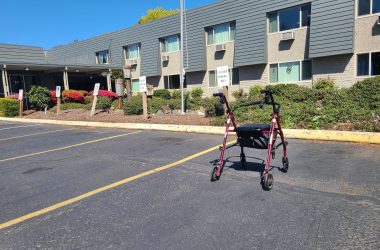
Marion County Commissioner Colm Willis, worried therapists may be advocating for gender reassignment surgery in children, recently moved to defund training for clinicians who work with transgender people, according to a recently filed complaint.
Willis’ concern was backed by Marion County Commissioner Sam Brentano.
“We shouldn’t be recruiting, which it sounds like,” Brentano said, according to meeting minutes.
The topic arose at a May 21 meeting for Behavioral Care Network’s board. The organization administers mental health programs in Marion and Polk counties for people on Oregon Health Plan.
Board member Jackie Haddon, director of Valley Mental Health, a Salem behavioral health clinic, filed the complaint against Willis after the move to cut funding. She sent a letter to the board’s leaders and to the organization’s legal counsel, she said.
Some board members said they were “blindsided” by Willis’ move, according to minutes from the meeting.
Willis said he felt trainings for clinicians, whose diagnoses of gender dysphoria are required before gender reassignment surgery, could be damaging to children, the minutes said. Gender dysphoria is the underlying distress when a person identifies their gender as other than the one on their birth certificate.
In her complaint four days later, Haddon said Willis’ actions violated non-discrimination policies for county commissioners and said he should be taken off the board.
“Our role as BCN board members is not to determine what part of our member population deserve high quality services and what part of our population do not based on our individual beliefs,” Haddon wrote in a letter to the network board chair, Polk County Commissioner Craig Pope.
The complaint will be heard at the network board’s meeting on Thursday, June 27.
Willis, a first-term commissioner, told Salem Reporter he supported clinicians who work with the transgender community. He disputed his actions could be construed as discrimination.
“I would never discriminate against a transgender individuals and I did not do so in that meeting,” he said. “The voters elected me to make budget decisions based on our shared values and I did that to the best my ability.”
Willis said there is a difference between providing care, mandated by the Oregon Health Plan, and hosting trainings and conferences. He said his concern about children emerged when he learned Marion County’s own clinic for people aged 25 and younger had specialists in diagnosing gender dysphoria.
“There’s a number of studies on this that show most children who experience feelings of not being comfortable in their biological sex grow out of those feelings as they grow older, so I think if you start hurting kids’ biology during that time, that can have lifelong detrimental effects,” he said.
He added: “What I said in the meeting was that I don’t think we should be providing services that support medical transitions for children.”
His concern included a training scheduled for June 20 involving representatives of the transgender health program at Oregon Health & Science University. A flyer for the session said the goal was to improve clinicians’ ability to understand the nuances between gender dysphoria and gender identity.
Nancy Rickenbach, CEO of Willamette Valley Community Health, which contracts BCN, said such trainings help clinicians from myriad specialties stay update on best practices.
“Providers need proper training and education,” she said.
Haddon, in an interview Wednesday, said the training would be especially important to clinicians who work with adolescents who are questioning their gender identity.
“If you don’t have a trained clinician who can identify if (a child) is struggling with gender dysphoria or gender identity, then that’s correct — they may go down a path that may not be best for them,” she said. “A trained therapist helps an adolescent figure out if what they are experiencing is true gender dysphoria or some of the other gender identity issues that are a regular part of adolescence.”
Rickenbach said Willis has the right to speak his mind but “it just didn’t happen in a way that anyone in the room was prepared for.”
The minutes show Willis and Brentano surprised their fellow board members by asking for a vote to stop funding for the training.
The minutes show the board had been discussing the network’s budget when Willis said he had a “policy issue I want to bring up.”
“I read that the BCN is looking to hold a couple conferences to talk about care for transgender folks in our community and so I looked up our policy statement on it. The first part, I agree with completely, it says mental health care professionals serve several essential and different functions of providing transgender healthcare,” he said, according to the minutes. “I agree with that 100 percent.”
“However, the second part I don’t agree with and it concerns me. The second is to provide mental health assessment and diagnosis for gender dysphoria to support medical transition. This is an area I am concerned about, especially when it comes to kids. One of the things that it looks like we have some mental health providers who do this work,” he said, according to the minutes. “I don’t think we should be spending some money supporting that sort of advocacy.”
Rickenbach responded at the meeting that training is important for providing care. Willis agreed that providing care outlined in the Oregon Health Plan was important.
“That doesn’t mean we have to host those conferences or trainings,” he said, according to the minutes. “There’s no requirement that we do that,” he said.
Rickenbach responded that the board was expected to provide training and education.
Brentano replied: “Let’s just say we won’t. Let somebody else do it. Excuse me, but that’s how I feel. We won’t have conferences. They can provide them if they want. I’m really good with that.”
“Yeah, I don’t think we should do it,” Willis said.
After Haddon said defunding trainings would lead to less-trained clinicians, Willis said the state should provide trainings instead.
“We are the policy makers for this organization so I think what I would do is make a motion not to provide this training through us,” he said.
Board members then discussed what the training sessions entailed. Willis worried that if Oregon Health & Science University was involved, the training would ultimately put children on a path to gender reassignment surgery.
“OHSU does most of, or a lot of surgeries for this population, but there is a requirement that counselors basically make a diagnosis before they can get a surgery,” he said. “I don’t think that our counselors should be making diagnoses to support this type of surgery, especially for kids.”
“I don’t think that’s a scope that we can say counselors shouldn’t do that,” said Rob McAdam, a staff member for Behavioral Care Network. “That’s within their scope of practice. It’s part of their benefit.”
“We don’t have to facilitate it, for heaven sakes,” Brentano said. “That’s what we’re doing here. I agree that we shouldn’t be.”
Pope, the board chair, then pointed out the motion surprised the board.
“This wasn’t on the agenda and I’m not prepared to vote on it personally because I don’t know about your subject to even make an honest and informed decision about this. I feel a little blindsided by this at the moment,” he said.
Board members then voted with Willis and Brentano the only directors to vote for the defunding. Pope, Rickenbach and Haddon voted against it. Marion County Commissioner Kevin Cameron and Marion County’s chief administrative officer, John Lattimer, abstained.
In a statement issued Tuesday, Justin Hopkins, executive director of the network, acknowledged the events.
“Despite these discussions, the BCN remains steadfast in our commitment to support members of Willamette Valley Community Health in need of behavioral health supports, regardless of their race, color, national origin, religion, marital status, gender (including gender identity), age, sexual orientation, or disability,” he said.
“The BCN does not tolerate discrimination in our workplace, nor would we promote any level of discrimination against our members in the community. Our mission is to improve the lives of our members through investments in community resources and access to high quality, integrated mental health and addiction services. This mission statement holds true for our entire population. The upcoming event will continue as planned.”
Have a tip? Contact reporter Troy Brynelson at 503-575-9930, [email protected] or @TroyWB.









